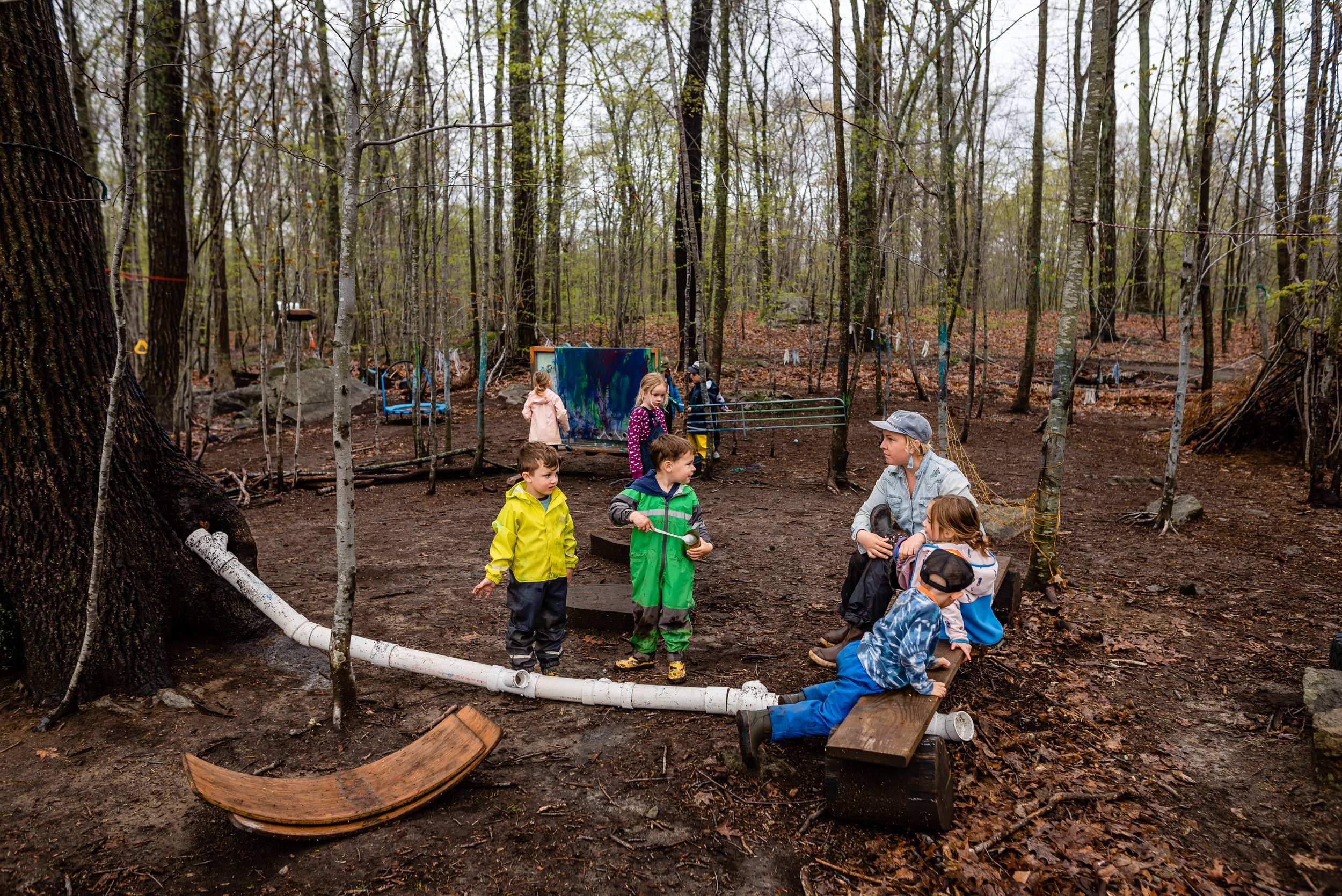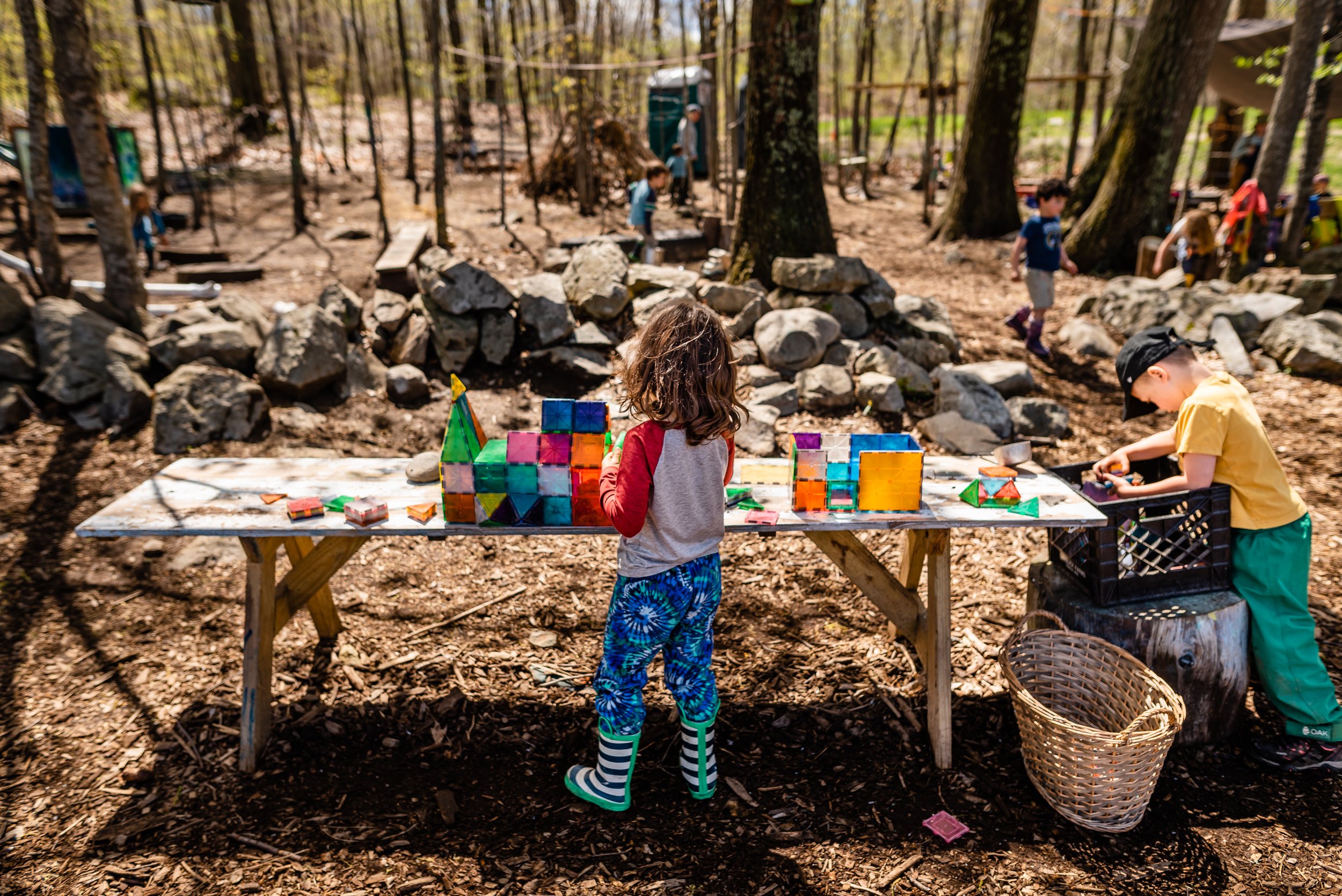
PRESCHOOL
CHICKADEES
AGES 3-4
The forest is an amazing place for our youngest friends to explore, capture their curiosity, practice adventurous play and independence, and gain experience in the social skills necessary to be mindful classmates and friends. Learning follows the children’s interests but takes place through play, the seeking of answers, and listening to the natural language of the forest.
The primary focus for the Chickadees is social-emotional learning, as they navigate time with peers. Giving each child a strong sense of self, the ability to speak up for themselves and express their needs, and feel joy in the forest on a daily basis (no matter the weather) are our goals for this age group.
Chickadees are birds we see and hear in New England throughout the year.
Chickadees are birds we see and hear in New England throughout the year. Their classic black, gray, and white coloring are easily identifiable and even our youngest friends can recognize their “chicka-dee-dee-dee” call, especially when they hear it from their teachers.
TANAGERS
AGES 4-4.10
In their second year of preschool at Heartwood, Tanagers engage in the same open-ended forest play experience as their Chickadee friends, but usually begin to show interest in more intellectual learning. Though we still devote a great amount of time to social-emotional skills, we begin to explore intentional nature connection practices, which lead to keen awareness, observation, and understanding. As the children are constantly asking questions, seasonal changes, planting and harvesting routines, migrations, and the balance of the ecosystem all become part of the daily invitations to learn. These observations are recorded in the children's nature journals, which nurtures their early literacy skills.
The children take a much deeper dive into emergent curriculum in this second year. Learning is organic, meaningful, and long-lasting. Past topics include the moon and its cycles, trees, birds and their nests, trash and its effects on the planet, ecosystems and the food web, and drought. Our observant teachers guide and supplement the children's learning on these topics, providing books, materials, activities, art, questions, and projects that weave in much of the Massachusetts standards for preschool and pre-K.
Tanagers are beautiful, scarlet red birds who migrate to New England in the late spring to breed.
The Tanagers at Heartwood search for this sweet bird each year!






a Preschooler
at Forest School
A DAY IN THE LIFE OF
Preschoolers arrive at 8:30 a.m. and enjoy a slow start to the morning, greeting friends and teachers, eating snack, and gathering for a circle. The children then head out for a morning adventure in the nearby woods, in the fields, or in our gardens.
They typically return to the Yurt for lunch before spending the last hour in the Yurt Yard exploring curriculum choices, building invitations, or art and sensory explorations. The children close with a Gratitude Circle, telling the story of the day, expressing gratitude, and reflecting on their shared experiences before heading home or transitioning to our Extended Care Program.
Preschool Class Times
8:30 a.m. to 1 p.m. (M-F, M/W/F, or T/TH)
Optional extended day, 1-3 p.m.
Children do not have to be potty trained to attend.
KINDERGARTEN
OVENBIRDS
AGES 5 or turning 5 before December
Our Ovenbird friends will explore the curiosities and magic that abound in the forest in addition to the intellectual pursuits that become so central during this year. Children at this age are naturally curious about letters, numbers, and how things work. We capitalize on this internal desire and expose these young learners to everything that would be covered in a traditional kindergarten classroom, but do so in a much less conventional way through an emergent curriculum.
This experiential method imprints a love of learning that will last a lifetime while still working to prepare them to enter first grade the following year. However, we are not an academic school. We believe the pushdown of academic learning into these early grades is not developmentally appropriate and is detrimental to the growth children are intended to undergo at this age. We believe in play-based kindergarten that ignites passion in the learning experience, builds character and confidence, and allows children slow time to play, embrace nature, and enjoy their lives. That being said, children are curious creatures and we often finish out the year covering nearly every state standard for kindergarten, and sometimes more.
In this kindergarten year, we deepen the children's nature connection practices, introducing longer routines and nature connection games that teach cooperation, animal instincts and observation, tracking, and meditation.
Our kindergarten year is best seen as a transition year for children to get an extra year of play. Many of our students continue on to public kindergarten afterwards. It is best to check with your local school district whether or not they allow 6-year-olds to enter kindergarten.
Ovenbirds are tiny migratory birds who spend their summers in New England.
Their nests are made on the ground and resemble a clay pizza oven. Their call is a resounding, "teacher teacher teacher" that can be heard throughout the forest, a similar call to the children when they find something exciting in nature.

a Kindergartener
at Forest School
A DAY IN THE LIFE OF
The Ovenbirds spend the first bit of their morning acclimating to the forest and checking in with teachers and friends. We gather for a morning circle during which we greet each other, discuss the morning's invitation, and make a plan together for our day.
Ovenbirds will typically engage in 45 minutes of curriculum work in the Longhouse each morning before heading out on an adventure and a picnic lunch. This learning continues as we enter the forest, and learning options such as books, field guides, manipulatives, and art materials accompany us in our wagon.
We return to the Yurt before the end of the day to pack up and enjoy a Gratitude Circle to close our day. We tell the story of the day, reflect, and sing before heading home or to our Extended Care Program.
Kindergarten Class Times
8:45 a.m. to 1:15 p.m. (M-F, M/W/F, or T/TH)
Optional extended day, 1-3 p.m.
AFTER-SCHOOL PROGRAMS
AGES 6-10
AFTER-SCHOOL
NATURE CLUB
TUESDAYS / YEAR ROUND
3:30-5:30 p.m.
CO-ED
School-age children deserve joy, magic, connection, and peace. Our after-school program strives to do just that. Children enrolled will explore the forest under the guidance of teachers dedicated to deepening their connection with the wild earth. Although the focus will be play, children’s curiosity will be piqued as they cultivate their internal ecological literacy and social-emotional skills. Children will be immersed in the forest for play, shelter building, carving and whittling, fire building, and nature connection games.
AGES 6-12
WILD LITTLE
WOMEN
WEDNESDAYS / YEAR ROUND
3:30-5:30 p.m.
FOR FEMALES + THOSE WHO IDENTIFY AS SUCH ONLY
In this day and age, there is still a bias against women in the outdoors. I've felt and heard it myself on trail. Cultural norms also tell girls they can't get dirty and need to look and act a certain way at all times. We aim to be a part of shattering that mold by working with girls in nature to instill in them confidence, comfort in the great outdoors, and a spirituality that comes along with being one with nature. Participants can plan to get dirty, explore, make maps, whittle and carve, learn how to build fires and shelter, and forage from the beautiful wild Earth.
We do not hold after-school programs during the month of January as it’s quite dark. We resume in February for some amazing winter exploration.
We strongly recommend that students commit to a year-long enrollment to experience the entire life cycle of the forest and the seasons.
Email Martha at heartwoodnaturecollective@gmail.com to secure a spot for your child.
SCHOOL CALENDAR
2023/2024
September 5th - First Day of School
Staff Development Day - October 6th
Indigenous People’s Day - October 9th
Veteran’s Day - November 10th
Harvest Break: November 20th-24th
Winter Break: December 20th - January 3rd
Martin Luther King Jr. Day - January 15th
Staff Development Day - February 16th
February School Vacation - Feb. 19-23
April School Vacation - April 15-19
Staff Development Day - May 24th
Memorial Day - May 27th
June 13th - Last Day of School
*There is no school on Staff Development Days
SPECIAL EVENTS
Fall Potluck - Friday, September 22nd
Winter Solstice Celebration - Friday, December 15th
Spring Equinox Celebration - Friday, March 22nd
End of Year Celebration - Friday, June 14th
*All events subject to a different date as a result of weather that doesn’t permit us to gather outdoors.
FAQs
-
Children must come to school prepared for whatever the day may bring. In warmer months, cool and light-colored clothing and a sun hat are key. On rainy days, rain gear which includes waterproof rain pants/rain jacket, waterproof rain boots, a rain hat, and rain gloves will make for a successful day. In winter months, two layers (wool or synthetic base layer and a fleece layer) underneath a waterproof snowsuit or snow pants/snow jacket combo as well as a hat and waterproof snow gloves will keep your child comfortable.
Here’s a list of our favorite gear for all seasons in New England.
We love Outdoor School Shop as a one-stop shopping option that offers specific gear lists by region. Some of our favorite brands include Reima, Kuling, Polarn O. Pyret, and Bogs. Many of these can be found secondhand through past families or Facebook Marketplace. We also love Sierra Trading Post for deals on base layers, fleece layers, socks, and boots. Enrolled families will receive specific recommendations for the school year.
-
We come prepared and we PLAY! Children typically engage in vigorous outdoor play so they usually sweat underneath all their layers and are much warmer than the teachers! We have found that as long as students are dressed properly, the wintertime is one of our favorite seasons for exploration. When the temperatures are very cold, we will likely spend some time indoors (in either our Yurt or Longhouse) for snack, lunch, or play. When temperatures are downright frigid and below 17 degrees (a New England rarity these days), we may decide to close for the day in order to keep everyone safe.
-
We come prepared and we PLAY! The rain provides an exciting opportunity to collect rainwater, make mud pies and pizzas, splash in puddles, and get very dirty. This is good old-fashioned childhood and we’re here for it. In the proper gear, rainy days can be incredible! We have several covered areas for children to gather for meals and often bring tarps we can hang quickly into the woods with us for cover. We always have the Yurt and Longhouse if we need it, but in warm temperatures, we don’t need it. Thunder and lightning are the only reasons we close for the day in order to keep everyone safe.
-
Humans have learned through play since we took our first steps as Homo Sapiens. Children are curious by nature and experiment on a moment-by-moment basis. As they play and experiment, they learn everything from social skills to cause and effect. As academic learning continues to be pushed down on early childhood education, it is even more important to commit to play-based learning and allow children to do what they do best. Play is always exciting and joyful and is led by the children themselves.
A child in the mud kitchen pouring rainwater between containers is learning about differences in size and volume, seeing how one container holds all the water while another spills over.
A child at a table with blocks and dolls building a home for them is learning concepts about physics and geometry while creating a story. They are experimenting with plot and character development.
A group of children moving gutters and wood planks into position to maneuver a golf ball through the maze are working on physics and engineering, all while learning how to cooperate, negotiate, and communicate with friends.
A child in the forest searching for animal tracks or signs of animals is learning how to observe and practice patience, how to move quietly and connect the dots of a mystery. They are learning how to wonder and how to ask questions.
Teachers practicing Emergent Curriculum use keen observation skills to glean what they can about the childrens’ interests. They could take any of the learning experiences listed above and create a more focused learning journey. In our forest school setting, topics are often based in ecology or the natural sciences, but the children take us on a wild ride. Past topics include the moon and its phases, drought, storytelling and fantasy, birds and their nests, trees, music, and friendship/love. Teachers provide materials, books, stories, art experiences, and activities, weaving in learning from all aspects of literacy, math, and science when applicable.
-
Risky or adventurous play includes running, climbing, jumping, spinning, balancing, and much more. Each of these gross motor skills is essential in child development, play a valuable role in later academic learning, help regulate children, and teach incredible social-emotional skills. In practicing these skills on a daily basis in the forest, children grow strong, resilient, confident, and capable.
-
Mission Statement: "Combined with organic, intellectual learning and the cultivation of a moral compass that includes learning how to become allies in the worldwide struggle for equality and justice, children will emerge from this experience with a strong character, a curious and creative mind, and a generous heart."
We believe that learning about accepting differences in people at an early age can affect how a child perceives these differences later on in life. Some examples of what that may look like in practice: Preschoolers will be exposed to published literature that covers such topics as gay marriage, Trans people, and how every skin color is beautiful. Kindergarteners will hear age-appropriate retellings of the true story of Christopher Columbus and learn about modern racial justice movements through the eyes of Ruby Bridges, Rosa Parks, and Dr. Martin Luther King, Jr.
Heartwood is a safe place for people of all backgrounds, skin colors, sexual preferences, religious beliefs, and ethnic heritages. We see color and difference—and we celebrate it in all of its forms.
-
Forest school takes place outdoors with all of the creatures who reside there—the winged ones, the four-legged, the swimming ones, and yes, us too! We get to see the adventures of Farrah the Fox as she grows her fox family each year and eagerly await our migrating birds when they return in the spring, particularly Bluey, our Great Blue Heron friend. We consider ourselves very lucky to see deer and geese most mornings and the scat and signs of coyotes, bobcats, raccoons, and otters. We understand that this proximity to nature makes some uncomfortable, but we have never been harmed or threatened by any animal at Maple Crest. Teachers are all practiced outdoors people and keep a watchful eye when we are in the forest.
-
Ticks and mosquitoes are a nuisance we cannot completely avoid. We recommend light-colored pants tucked into socks, tucked-in shirts, and long hair kept back and under a hat. Bug spray is essential. We do not use DEET but recommend using Picaridin-based bug sprays on skin and treating clothes with Permethrin. Both will help keep ticks and mosquitoes at bay. We do daily baths and tick checks to avoid tick bites. For more information, visit our Instagram Story Highlights.











